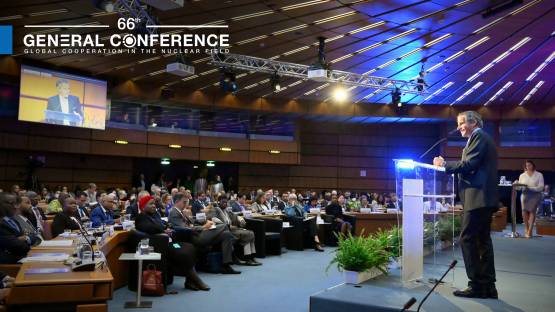The event Strengthening Nuclear Security Through Capacity Building and Education, organized by the European Union, the IAEA and the Czech Republic, covered the experience of the EU and the IAEA in supporting capacity building and education in nuclear security in Member States, and showcased the nuclear security achievements of the Centres of Excellence in Eastern and Central Africa.
The importance of international emergency preparedness and response (EPR) tools and mechanisms was the focus of the event, International Emergency Preparedness and Response (EPR): Tools and Capacity Building, organized by the United States of America. During the session, experts shared their perspectives on the experience of using such tools, and on EPR capacity building.
How the NUWARD small modular reactor (SMR) can offer a sustainable solution for quick access to baseload, dispatchable, affordable and low carbon power generation, was the topic of the NUWARD: Leading the Way to a Sustainable SMR Market event, organized by France. Attendees were given updates on NUWARD’s development, its structuring and partnership strategy, and the EU licencing strategy.
The Application of Non-destructive Testing for Cultural Heritage and Post-disaster Intervention event, organized by Italy, showcased Italy’s experience in this field and in preserving cultural heritage. At the event, the contribution of the Italian Society for Non-Destructive Testing Monitoring Diagnostics (AIPnD) to IAEA activities and technical cooperation projects, was highlighted.
At the virtual event, Decommissioning and Radioactive Waste Management: Lessons from the Past, Adapting to the Challenges of the Present and Sustainable Technologies for the Future, organized by the Russian Federation, participants learned about Russian activities in decommissioning and radioactive waste management. The event featured a discussion on scientific and technical collaboration to raise awareness of the importance of addressing decommissioning as a part of a sustainable future.
The event, 25 Years Joint Convention: A Proven Instrument for Improving Nuclear Safety and Promoting Transparency and Public Confidence in Spent Fuel and Radioactive Waste Management, organized by Switzerland, highlighted the importance of the Joint Convention on the Spent Fuel Management and on the Safety of Radioactive Waste Management, a unique ‘incentive’ instrument that addresses the safety of spent fuel and radioactive waste management on a global scale.
At the Modern Innovations and Belgian Know-how in Nuclear Cancer Therapy, Diagnostics and Theranostics event, organized by Belgium, experts presented key administrative and safety aspects of medical applications of ionizing radiation, and illustrated how innovative applications of ionizing radiation help in the fight against cancer.
The role that nuclear technologies play in enabling countries and communities to adapt to a changing climate was the focus of the Nuclear Sciences and Technology for Climate Adaptation event, organized by the United Kingdom.
The Redesignation of the CEA as an ICERR in Partnership with the IRSN event, organized by France, focused on the feedback from IAEA Member States on the French Alternative Energies and Atomic Energy Commission’s (CEA’s) first designation period as an IAEA-designated International Centre based on Research Reactor (ICERR). Participants also discussed the new scope of the CEA–IRSN designation and the potential links with other organizations.
Discussions at the virtual event, Sustainability Compliance Criteria of the EU Taxonomy for Nuclear Energy, organized by the Russian Federation, focused on the role of nuclear energy in the energy transition, safety of nuclear power plant operations, advances in developing tolerant fuel, technological solutions for closing the fuel cycle and reprocessing of spent nuclear fuel, and overall compliance with the criteria of the Complementary Climate Delegated Act to the EU Taxonomy.
Experts at the event, The Development of Alpha-emitting Radiopharmaceuticals, the Supply of Astatine-211 and the Role of International Organizations, organized by Japan, discussed the status of development of the alpha-emitting radiopharmaceutical astatine-211, the supply chains of such rare isotopes, and the potential role of international organizations in their practical use.
At the Trends in Nuclear Education virtual session, organized by the Russian Federation, discussions took place about the current trends in nuclear education and new science, technology, engineering and mathematics programmes. Participants also discussed how university networks can help enable cross-university cooperation and new research and education projects.
At the event Internet Reactor Laboratories: Remote Practical Learning Using Research Reactors, organized by Argentina, participants were introduced to the Internet Reactor Laboratories, established with IAEA support in four geographical regions to provide remote access to experiments conducted at research reactors for students and young professionals located in other countries. Attendees were also able to observe a live demonstration of a training session broadcast from one of the host reactors.
Representatives from Indonesia showcased a programme for capacity building in nuclear science and technology in other developing countries, as a framework for enhancing technical cooperation among developing countries and strengthening South–South cooperation, at the event, Promoting Capacity Building in Nuclear Science and Technology. Participants heard about how the programme builds on IAEA technical cooperation projects, student exchanges and internships, as well as researcher visits and post-doctoral programmes.
At an event, SMR Deployment Timelines: US Industry Updates, organized by the United States of America, US industry representatives from companies with plans to deploy small modular reactors (SMRs) by 2029 provided updates on their technology and timelines.
Technical experts presented the top five misconceptions about advanced reactors and their uses at the Advanced Reactors: Myths and Misconceptions event, organized by the United States of America.
During the event, Commemoration of the 30th Anniversary of the EUR Organization, organized by France, the European Utility Requirements (EUR) Organization showcased its achievements.











